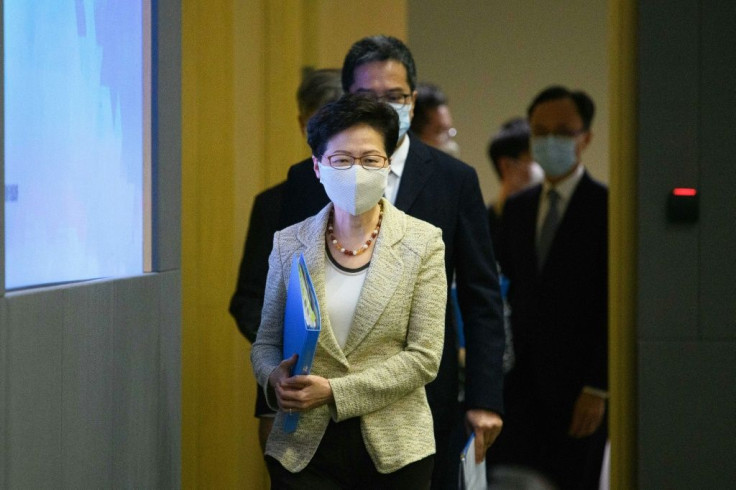Hong Kong Mass Virus Test Plan Hampered By Swirling China Distrust
Hong Kong's plan to offer free coronavirus tests to all residents has become swept up in the festering political debate dividing the city, where many remain deeply distrustful of both local leaders and China.
Billed as a benevolent public health initiative made possible with Chinese help, the city-wide tests are set to start on Tuesday in an attempt to stamp out a third wave of infections that have swept through the densely populated financial hub.
But the involvement of doctors and companies from the mainland has sent the rumour mills into overdrive and compounded fears of Beijing's surveillance state, while many health experts in the city have questioned the efficacy of a mass testing programme.
On the authoritarian mainland, biometric data forms a crucial part of China's vast security dragnet and many Hong Kongers fear mass testing will lead to widespread DNA collection -- something local authorities have strenuously denied.
The furore is the latest illustration of the polarisation in Hong Kong as Beijing clamps down on its critics after months of huge, often violent and ultimately unsuccessful pro-democracy protests last year.

"Public trust in Hong Kong's government has been hovering at all-time lows for many months," Dixon Sing, a political expert at Hong Kong University of Science and Technology told AFP.
China's involvement in the testing scheme, he added, "simply intensifies that distrust among the majority of the population".
The city had an enviable track record of keeping the coronavirus under control until July when infections began to soar, brought in by small groups of arrivals who were exempted from strict quarantine controls.

New cases rose to more than 150 a day and the city went back into an economically painful semi-lockdown. Citing the spike in coronavirus infections, Chief Executive Carrie Lam -- a pro-Beijing appointee -- postponed local elections for a year.
Daily infections have since dropped to the low double digits but authorities believe mass voluntary testing will help eliminate hidden transmissions.
More than 100 locations across the city, including schools and stadiums, have been set up to offer tests, staffed by some 5,000 volunteers.
"Although the tests are voluntary, we hope the public will take part together, for themselves and for society," civil service chief Patrick Nip said earlier this week.
But it is far from clear whether Hong Kongers will register en masse given the government's record-low approval ratings, especially after Beijing imposed a national security law on the city in late June to stamp out pro-democracy protests.

Jimmy Lai, a pro-democracy newspaper owner who was recently arrested under that law, said on Twitter that non-compliance with the mass testing might be a form of "passive resistance".
"(The national security law) atrophied trust in HK government, making it impossible to govern," he wrote alongside a link to a story on the testing scheme.
A major source of contention has been the involvement of three Chinese testing firms and doctors from the mainland.
Facebook groups have been filled with concerns ranging from whether the tests will meet international standards, fears of DNA collection and whether Hong Kong might introduce the colour-coded health apps used by China to control where people can travel.
Hong Kong's government has vowed that testing standards are up to par and that suggestions of DNA harvesting are "absolutely unfounded".
It said samples "will not be transported to the mainland for testing" and warned anyone spreading false rumours could be prosecuted.
On Tuesday, Lam accused health experts who had criticised the mass testing plan were motivated by politics and anti-China sentiment.
"I can't think of any other reason," she said, in comments that sparked anger within the medical sector.
Much of the criticism of the testing plan has come from leading epidemiologists helping the government battle the virus.
Microbiologist Ho Pak-leung likened city-wide testing to "wasting bullets", saying a targeted pursuit of vulnerable and at-risk communities would be better.
Others said they feared gathering people for mass testing might help spread the virus.
David Hui, a leading epidemiologist, has supported the mass testing but said it needs widespread take-up to work.
Surya Deva, a public policy expert at the City University of Hong Kong, said that may be tricky given the deep distrust in the government.
© Copyright AFP 2024. All rights reserved.





















